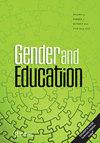通过女权主义集体构建社群:学术界女性的存在与成为
IF 1.9
3区 教育学
Q2 EDUCATION & EDUCATIONAL RESEARCH
引用次数: 0
摘要
摘要本文从女性主义、跨学科、跨学科的角度,通过集体传记,探讨女性在学术界的经历。跨学科、分类和学科立场,我们通过对话来探索女性在学术界的细微差别,以及作为女性建立和发展社区的经验。我们利用了2020年秋季焦点小组的数据,在该小组中,我们每个人都参加了设计定性调查的课程,以及我们的反思、备忘录和随后对话中的对话。这些对话用脚注来强调,脚注同时播放研究、艺术和音乐,反映女性的生活和经历。我们使用诗歌转录和有声诗歌来提供我们经历的质感,为研究和研究学术界的女性经历提供方法论和实证意义。本文章由计算机程序翻译,如有差异,请以英文原文为准。
Building community through feminist collectivity: being and becoming women in academia
ABSTRACT This paper explores women’s experiences in academia through collective biography from a feminist, transdisciplinary, intersectional frame. Crosscutting disciplines, classifications, and subject positions, we use dialogue to explore the nuances of what it is to be a woman in academia, and the experiences of building and developing community as women. We draw on data from a fall 2020 focus group where we each were part of a course in designing qualitative inquiry, as well as our reflections, memos, and conversations in dialogues that followed. These dialogues are accentuated with footnotes that function as a concurrent playlist of research, art, and music reflecting women’s lives and experiences. We use poetic transcription and audio poetry to offer the texture of our experiences, offering both methodological and empirical implications for studying and researching women’s experiences in academia.
求助全文
通过发布文献求助,成功后即可免费获取论文全文。
去求助
来源期刊

Gender and Education
EDUCATION & EDUCATIONAL RESEARCH-
CiteScore
5.20
自引率
9.10%
发文量
31
期刊介绍:
Gender and Education grew out of feminist politics and a social justice agenda and is committed to developing multi-disciplinary and critical discussions of gender and education. The journal is particularly interested in the place of gender in relation to other key differences and seeks to further feminist knowledge, philosophies, theory, action and debate. The Editors are actively committed to making the journal an interactive platform that includes global perspectives on education, gender and culture. Submissions to the journal should examine and theorize the interrelated experiences of gendered subjects including women, girls, men, boys, and gender-diverse individuals. Papers should consider how gender shapes and is shaped by other social, cultural, discursive, affective and material dimensions of difference. Gender and Education expects articles to engage in feminist debate, to draw upon a range of theoretical frameworks and to go beyond simple descriptions. Education is interpreted in a broad sense to cover both formal and informal aspects, including pre-school, primary, and secondary education; families and youth cultures inside and outside schools; adult, community, further and higher education; vocational education and training; media education; and parental education.
 求助内容:
求助内容: 应助结果提醒方式:
应助结果提醒方式:


